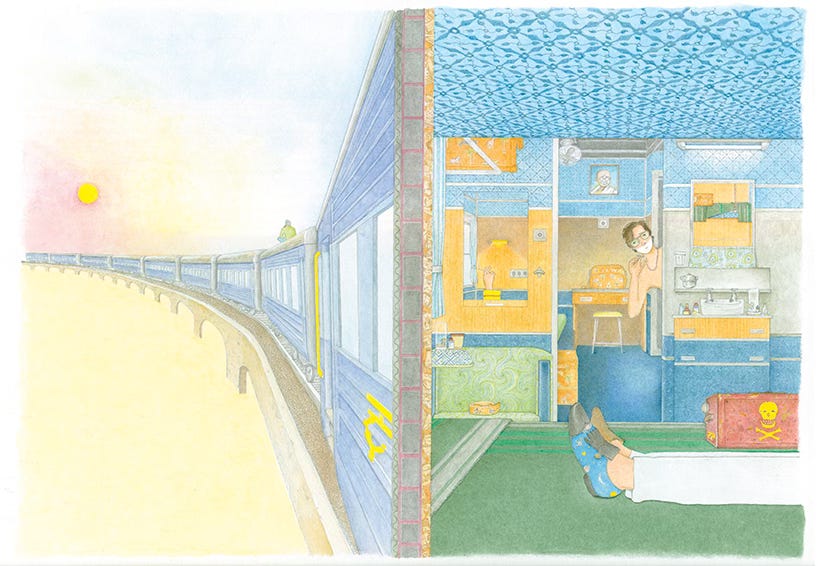If you’ve been drawing sharks for an hour
Five fragments for the week of June 9, 2025

Hello from the second week of June, and my second week at Gamma. Last week, a ball game; this week, a new office.
Here are five fragments that stuck with me last week…
everyone wants to automate their most tedious work with AI but a lot of tedious work is quite high leverage, especially when it comes to writing, synthesizing, and getting to clarity.
this is why I still always take notes by hand for anything important, read raw survey results/CS transcripts verbatim, and put in the work on slide headlines.
in hunting for parts of your job to automate, instead of asking "what work do I find tedious / annoying," better to ask "what is my lowest leverage work?" this tends to be work that is repetitive, doesn't advance your thinking, and does not require interpretation.
– Hilary Gridley on X, June 8, 2025. “A lot of tedious work is quite high leverage” rings true to my experience, and it’s been a trip as I start this new job to try to figure out which “tedium” to embrace—like wading into a stream, finding the eddies, and trying to feel out the individual water molecules within them. Related: Hilary’s thoughts on slides, and mine. (<3 Hilary <3)
The first thing we had to do was make our own knife – essentially a long piece of wood with a piece of metal type as a counter balance at one end, and a single-edged razor blade taped to the side at an angle to enable the edge, up to a certain level, and the point, to be manipulated freehand depending on whether you held the knife near to the blade end or at the far end of the ‘handle’ this would give access to a range of curves from very tight to long shallow sweeps – the knife being held relatively still while the Rubylith itself was pivoted around by your other hand. Sounds crazy – but it worked.
– Freda Sack as interviewed for United Editions about the early days of Letraset. (Still on the Rubylith beat from the last edition.) It gets better: “We also had to make another tool, consisting of a pencil-like piece of wood with a blade honed to the right degree of bluntness to peel out the surplus Rubylith from around a character without damaging the cut. I’ve still got both knives.” High-leverage tedium to a tee.
IMO, perhaps the coolest idea in Hypercard was:
Start by drawing stuff, not by programming
you can just start painting! Nothing fancy. Draw an ocean, draw some sharks.
then if you've been drawing sharks for an hour and you want to make them move... you can! with a bit of programming, designed to feel as friendly as possible.
– Geoffrey Litt on X, June 8, 2025. HyperCard: the original tool for imagination—its influence on generations of technologists exposed in a flash by people paying their respects to its creator, Bill Atkinson.
after witnessing ‘the miracle of the survey map’ I was in kind of a stupor. not quite sure what I was doing, I caught the bus to a toy store, the one place I knew of that sold art supplies. all I could think was that the novel I’d been working on – and struggling with – needed a map. I felt like I’d unlocked the secret.
subsequently I made many maps for that story before putting away the manuscript. the maps turned out better than the novel. as I continued writing, the map making kept improving and leading to interesting opportunities – and before I knew it, I was an illustrator.
– Eric Chase Anderson as interviewed for Designboom, November 5, 2013. I went to see The Phoenician Scheme with some of the Gamma team at the end of last week (forever mesmerized by Wes Anderson’s cinematic universe) and got curious about his cast of collaborators. This sent me down a rabbit hole that led to this interview with his younger brother, Eric, a frequent illustrator for his projects. (Paging Robin Sloan: maps are where it’s at.) The interview is bursting with golden details, including a description of oil paints as “formless, colored glue” and a love letter to his Sanford mechanical drafting pencil. I also appreciated his meditations on being a writer: “if you feel like you have several of these secret projects hidden somewhere inside you, it is very difficult to find happiness doing anything else. I firmly believe being a writer is about being a certain kind of person. unless you’re more or less built for it, it will be disagreeable and result in great conflict. it’s a totally private experience.”
After our bellies were singing with satisfaction, we would retreat to Charlie’s tasteful home. It was beautifully curated with great books, storied art, and well-placed decor, reflecting his tenure as a New Yorker. Then you’d notice the eclectic instruments. Before a chance to inquire its origins, you’d find yourself engrossed in a full sense experience. Palo santo is burning, live jazz ablaze, Charlie’s butt has locked onto his piano chair and he is swaying his body like Keith Jarett. Almost simultaneously, he’s pouring us fragrant mezcal shots in beautiful artisan cups “just to sip on” and he’s challenged Jay to a game of chess, replacing the soothing jazz with techno on full blast. Though I’m not typically engaged watching dudes play chess, drunken techno chess I’d sign up for any day.
– Annie Zhang, “Charlie Colored Glasses,” Capsule, May 20, 2025. I adore Annie’s thinking (her old podcast, hello metaverse, is a treasure), but reading this piece reminded me of how much I love her quality of attention, too. After days at a stretch spent accidentally zipping along in a slipstream of LinkedIn-ese, what a pleasure to encounter a true voice.
Until next time,
Diana
https://dianaberlin.com


